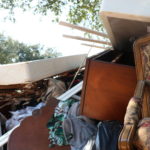

Researchers at the Hobby School of Public Affairs aim to understand the effects of Hurricane Harvey by following a group of up to 2,000 Houstonians for five years. | Emily Burleson/The Cougar
Cleaning up the damage caused by Hurricane Harvey and moving forward will be a lifelong journey for many Houstonians, and a study by researchers at the Hobby School of Public Affairs seeks to learn from it.
Renée Cross, associate director of the Hobby Center for Public Policy, sees the study as a road map to understand the behaviors of people undergoing disaster preparation and what they do in the aftermath of a storm.
“We’re looking not only at what happened (to them) during Harvey, but what is happening to them after,” Cross said.
In the coming weeks, Houston-area residents will receive phone calls via a process called random digit dialing, in which phone numbers are generated randomly, according to a news release. Participants will be asked to respond to an array of questions surrounding their Harvey experience.
The panel-based survey will follow between 1,500 to 2,000 people for the next five years in four counties that encompass parts of Houston: Harris, Montgomery, Fort Bend and Brazoria.
Researchers, according to the press release, will examine recovery and disaster preparedness efforts and attempt to gauge public support for policy proposals like flood mitigation, disaster-relief strategies and others. The survey lists questions that will focus on how their actions were influenced by past severe weather events, what information they sought out before the hurricane and what knowledge they have about policies in the Houston area that focus on natural disasters.
Corporate communications senior Jackeline Ardon has seen the damage caused by Harvey firsthand and continues to work in its aftermath every day. The building she works in at the East Houston Regional Medical Center took on 6 feet of water, and two months after the storm, daily duties are still conducted at a snail’s pace, she said.
Ardon sees the city of Houston in desperate need of a flood plan so that businesses don’t spend months in short supply of resources or space after hurricanes. Ardon said there must be some sort of system in place.
Similar studies have been performed by universities following events like Hurricanes Katrina and Sandy. The researchers are drawing on the expertise of members like Robert Stein at Rice University’s Baker Institute of Public Policy, who has surveyed people who experienced the effects of Hurricanes Katrina, Rita and Ike.
The second wave of the study is expected to begin in six months, Cross said. Over the course of five years, the study will look to gauge the interest and commitment of residents to seriously explore policy options that could potentially cost massive amounts of money, like the construction of a third reservoir to complement the aging Barker and Addicks reservoirs.
The city’s residents have already been confronted with lingering issues that demand to be addressed, but mechanical engineering senior Isaac Lingenfelter said that before any concrete steps can be taken, people need to know what’s going on.
“There’s a lot of people who stayed in their homes,” Lingenfelter said. “So making sure that people know when it’s an issue, when it’s a serious issue, having time to get out is equally as important.”
Cross said understanding these issues that show no sign of disappearing is important, but for change to occur, communities will need to see themselves not as independent, but as units that can move toward definitive fixes.
Collecting thousands of responses will aid the effort of helping people realize they’re not alone in the aftermath, Cross said.
The research is also meant to help gauge public opinion toward specific flood-related policy proposals, Cross said.
news@thedailycougar.com
—
“Newly launched study will survey effects of Harvey” was originally posted on The Daily Cougar
